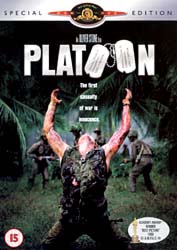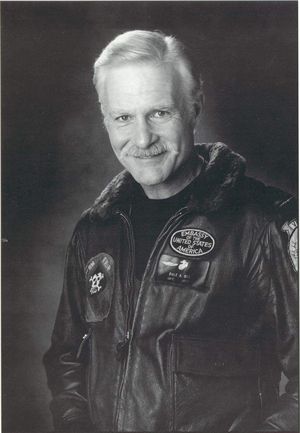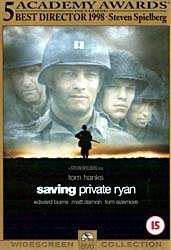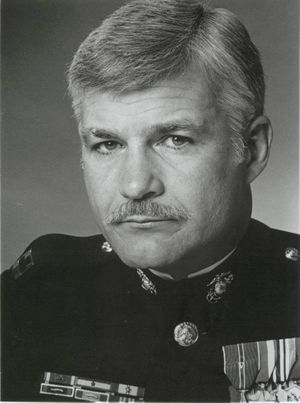Dom Robinson interviewsCaptain Dale Dye
 Captain Dale Dye played Company CommanderCaptain Harris in the classic Oliver Stone Vietnam war filmPlatoon,released as a Special Edition DVD in September 2001 (right).
Captain Dale Dye played Company CommanderCaptain Harris in the classic Oliver Stone Vietnam war filmPlatoon,released as a Special Edition DVD in September 2001 (right).
He has since appeared in scores of other films and worked on them as thetechnical advisor and it is our great pleasure to be able to interview himin connection with the release of this DVD.
A review of the DVD can be foundHERE,

- I’m Captain Dale Dye, U.S. Marine Corps (Ret’d), 22 years activeservice; retired in 1984 and went into the film business. Born 8th Oct 1944in Cape Girardeau, Missouri USA.
- Was always a big fan of war movies… naturally… but found that mostof them angered or upset me because they did not reflect what I knew to bethe reality of military service and combat from my own experience. Idecided someone had to fix that… and that someone should be me.
- Just a few weeks actually. I discovered from reading the “tradepapers” that he was going to do a film based on his own experience inVietnam and I wanted to be involved as a test of my theories about how tomake realistic films on the subject. I called him one Sunday and introducedmyself and told him I thought I knew how to do it better than Hollywood haddone it in the past. He listened, decided he liked what he heard and we setup a meeting. Given our common experience as combat soldiers, he saw thevalue of my theories and we got on with it.
- I have many fond memories… but perhaps the most touching for mepersonally is when we were filming the village scene in which Tom Berenger’scharacter interrogates a village woman and subsequently executes her. Weused genuine Vietnamese refugees and they naturally spoke Vietnamese to eachother on the set. There was something about hearing that language… thosevoices… in that setting… that sent both Oliver and I right back toVietnam. We glanced at each other and then quietly walked off the set. Wesat down on a rice paddy dyke… and I put my arm around his shoulders.
Nothing was said… or needed to be said. We just understood what washappening in each other’s minds at that point. We shared the pain and thememories. It was one of the experiences that made us fast friends. Weremain that way to this day.
- Part of the answer to this question is referred to in your secondquestion. When I retired from active service, I had virtually no civilianskills, so I looked around for something to do that would combine both myinterest and my passion. War movies seemed to fit the bill, so I headed forHollywood with a half-baked idea in mind that I knew how to make better warfilms. The major studios were – naturally – not very interested in hearingmy pitch since they’d been making successful war films for many yearswithout my methods. When I managed to meet Oliver, he understood what Iwanted to do and gave me a chance. I believe good acting is about tellingthe truth… or at least convincing an audience that you’re telling thetruth.
To do that – in my opinion – an actor needs to have some noddingacquaintance with what the truth is. So, I strip them of their ShowBusiness personalities and introduce them via full-immersion to the life ofa combat infantryman. This involves totally isolating them, reducing themto a lowest common denominator and forcing them to live life in therough… with all that entails. It’s much the same as a young recruit fromthe UK or US gets when he joins the Marines or some other eliteregiment.

- I have two particular favorites among the 40 or so films I’ve done -other than Platoon. The first isSaving Private Ryan (right),because I think inthat project we raised the standard of pictorially representing what combatis like in a full-blown amphibious assault. It required me to sort of playGeneral Eisenhower, running upwards of 1,000 men on the beach, 7 ships atsea, 6 armored vehicles and a whole company of German defenders. I made allthat work using five radios from the high ground behind the beach. It was asignificant command and control challenge… but we did it.
Secondly, I’m very proud of the new TV series Band of Brothers which is on HBO in theStates and will be on BBC2 here in UK. This series – which took us a yearto make – provides a full 10 hours of TV time to tell the story of oneAmerican airborne infantry unit and their part in WW II from D-Day to VEDay. It’s rare when you get an opportunity to stay with a story and a castof characters that long. It’s also satisfying that my training of theactors was sufficient to keep them in their roles and soldiering (notacting) for an entire year.

- It’s the nature of my own professional beast, I’m afraid. I love itwhen I get the rare opportunity to play a doctor, politician or lawyer(villains are particularly fun), but I understand that I’m not the leadingman type. What I do in military roles helps me with my overallagenda… which is to help change the stereotypes and misapprehensions aboutprofessional soldiers. And it keeps me working.
- I’m slowly moving into writing, producing… and hopefully,directing. As I get older, the acting roles become more limited and thereare only so many war films made in a given period, so I like to keep my eggsspread around in several baskets. I’ve got some personal stories that Iwant to get told… and as I move into producing, it’s more and more likelythat I’ll have the clout to get them done.
For more info on Captain Dale Dye, read his entry in theInternet Movie Database
Reviewer of movies, videogames and music since 1994. Aortic valve operation survivor from the same year. Running DVDfever.co.uk since 2000. Nobel Peace Prize winner 2021.
